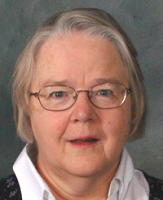“Therefore we must prepare our hearts and our bodies to do battle under the holy obedience of His commands;
and let us ask God that He be pleased to give us the help of His grace for anything which our nature finds hardly possible.”
—Rule of Benedict Prologue
For forty years I worked under layers of authority: supervisor, director, Chief Pathologist, and vice president. For the last ten years of my career I was a supervisor myself, entrusted with guiding the work and mentoring my coworkers. I learned how it feels to be responsible for the work of people who want to follow their own way. Though I may have chafed under authority’s demands when I was young, experience taught me that cooperation with authority is essential to getting a project accomplished peacefully, on time, and within budget, while nurturing the minds, spirits, and relationships of the workers. There is always a reason for an order. Obedience allows me to live with discipline and intention. I rid myself of willfulness and become clay in God’s hands, to be molded into whatever God needs.
All valid authority can be traced back to God, and flows from the Spirit. When I obey God I become part of God’s great story of salvation. Becoming obedient is the necessary first step for learning humility, to see myself as I truly am, without ego, and playing a minor role in the scheme of things. This means I respect and follow the guides God placed over me. Benedict said that the third step of humility is reached when, “out of love of God, one obediently submits to a superior in imitation of the Lord.”

When a superior makes a request, Benedict says, we “receive it as a divine command and do not delay in executing it.” When called by bell, prioress, or another Sister, I obediently set aside whatever I am doing and hurry to obey “without hesitation, delay, lukewarmness, grumbling, or objection.” Attitude matters. The Rule calls me to obey with a willing and cheerful heart; if I respond grudgingly, “even though she fulfill the command yet her work will not be acceptable to God, who sees that her heart is murmuring”.
In the real world, of course, sometimes I disagree with an order. The Rule directs me to gently and respectfully discuss why it will not work, suggest an alternate action, come to a resolution, and then obey. It is a mark of humility to obey without murmuring or anger. I still remember what it was like to implement an unpopular decision. Of the role of the Prioress, Benedict said, “Let the Abbess always bear in mind what a burden she has undertaken and to whom she will have to give an account of her stewardship, and let her know that her duty is rather to profit her sisters than to preside over them.”
Why should I obey when it may mean impossible, dull, or fruitless labor? In monastic life, the fuller meaning of what we do is hidden. When I obey a superior willingly, without question, I become a little more humble, and each time it brings unexpected grace. Obeying when I don’t understand the whys and wherefores, and accepting my humble role, fills me with surprising joy. I acted out of love, and gladdened God’s heart. It teaches me that I really don’t understand everything that happens in or around me. I follow the way of obedience, and rely on God to weave what I do into his plan.
St. Paul captured the crux of the matter when he wrote to the Philippians, “Let the same mind be in you that was in Christ Jesus, who, though he was in the form of God, did not regard equality with God as something to be exploited, but emptied himself, taking the form of a slave, being born in human likeness. And being found in human form, he humbled himself and became obedient to the point of death — even death on a cross.” As a servant I no longer follow my own will, but Christ’s, and don’t need to know purpose and outcome. It is enough to obey. As Paul wrote to the Galatians, “I have been crucified with Christ; and it is no longer I who live, but it is Christ who lives in me.”
So, on August 31 at Evening Prayer, I will promise stability, fidelity to monastic life, and obedience, because I choose to live the Paschal Mystery. Jesus warns, “Enter through the narrow gate; for the gate is wide and the road is easy that leads to destruction, and there are many who take it. For the gate is narrow and the road is hard that leads to life, and there are few who find it.” It is difficult to empty myself and take on Christ, but it brings great joy. I no longer know what I will be doing in ten years, but I have taken the narrow gate and trust in Christ.

As I finish this a heavy fog has moved in off the Lake; the world is hidden and sound, muffled. What is happening out there? Great changes may be happening: autumn may move in and set the forest blazing, the bears may all be dancing, but I can’t see it. Fog is an apt metaphor for my chosen life. I don’t necessarily understand or even suspect what is happening inside; but God does, and it is always a wonder and a miracle. As a community we Sisters may not see where we are going, we may stumble on the path at our feet; but we keep our eyes on the Cross, and that is enough for the day.
(Lower pic from https://www.facebook.com/joyofdad/photos_stream)
Sister Therese Marie Carson

Therese Marie was born in Detroit, Michigan and spent many years as a microbiologist in Harbor Springs, Michigan before coming to Duluth. She had heard a call to vocation since she was young, and found the courage to surrender to it when her faith in God caught fire and became deep love. She made her First Profession on August 31, 2014, at St. Scholastica Monastery in Duluth, Minnesota, and looks forward with joy to becoming a perpetually professed Benedictine. She believes with Albert Einstein that, “There are only two ways to live your life. One is as though nothing is a miracle. The other is as though everything is.“
